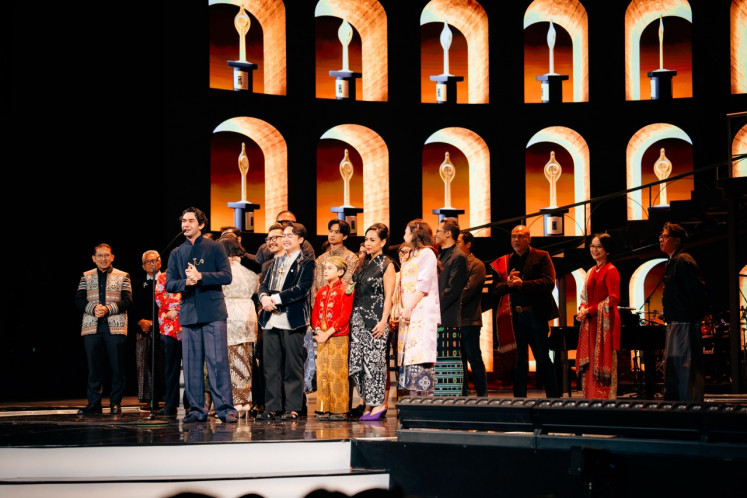Popular Reads
Top Results
Can't find what you're looking for?
View all search resultsPopular Reads
Top Results
Can't find what you're looking for?
View all search resultsLINE enters AI game set to dominate Asia
Change text size
Gift Premium Articles
to Anyone
J
apanese multimedia application LINE’s recent entry to the artificial intelligence (AI) industry could likely dominate Asia’s virtual assistant market, because of its primary focus and leverage in the region.
As a way to compete with current western-oriented artificial intelligence (AI) devices, such as Apple’s Siri, Google’s Google Assistant and Amazon’s Alexa, LINE developed its own AI system called Clova in about a year and aimed to bring Asia into the AI era, one country at a time.
Introduced at the Barcelona Mobile World Congress in February 2017, the Clova technology exists in LINE’s new smart home speakers, WAVE and the smaller CHAMP, as the company’s response to the growing technological advancements of the day.
Clova’s response mechanisms are tailored to process language in a more natural way, meaning that its responses are geared toward being more “human.” The importance of its human-likeness factor is stressed in LINE Chief Technology Officer (CTO) Euivin Park’s way of referring to Clova.
“It’s not just machine learning. [Clova] is aimed to be a virtual assistant that is close to our daily lives. Machine learning is just a component of the virtual assistant,” she explained at the recent LINE Developer’s Day summit in Tokyo.
As of September, the Clova technology is only available in LINE’s WAVE and CHAMP smart speakers, which will go on sale to the general public outside of fall season pre-sales, but only to those in Japan and South Korea.
Park elaborated that LINE had long-term plans to expand the Clova technology and the WAVE and CHAMP speakers to their biggest markets such as Indonesia, Taiwan and Thailand, but the plans would not be realized as yet.
Meanwhile, LINE also plans to integrate Clova into smartphones, as well as in cars, toys, home appliances and retail services.
In order to secure the technology’s future, the company has established partnerships with prominent Asian industry players, such as Toyota, Yamaha, Sony Mobile, LG, Takara Tomy and Family Mart, but has yet to provide details on whether or not Clova would be available in their products and services anytime soon.
The emergence of LINE’s Clova technology comes at a time when its Western counterparts at Google and Amazon have begun advancing the development of their own AI platforms in their own smart speakers, Google Home and Amazon Alexa.
Park comments that even though LINE’s entry into the AI market could be seen as relatively late, the company’s advantages lay inside the fact that they were focusing on their immediate markets for the time being. If the company had plans to expand their services, it was likely that these would be implemented within their largest Asian markets first.
“LINE is only five years old, but in that time we have grown rapidly. You can’t really fully compare us with [Google or Amazon], because they [...] have decades of experience. We only started this Clova project last year, but we have achieved the [initial] goal in that time. I don’t think there is any other company that can match us in that speed,” Park noted.
Similarly, LINE’s virtual assistant development manager Taiichi Hashimoto noted that the key to driving Clova’s development would be to work with as many developers as they could. Even in Japan, hiring AI talent is a challenge, due to the high competition among Japanese tech companies.
LINE therefore plans to open Clova’s application program interface (API) to all interested developers in 2018.
“I don’t think any company [in the smart home market] has a direct advantage over another. If we can fine-tune our technology in a better way, maybe we could get that advantage. Attracting talent will be competitive, and in all honesty, we need to get a lot more developers involved. That’s why we are opening the API,” Hashimoto said.











